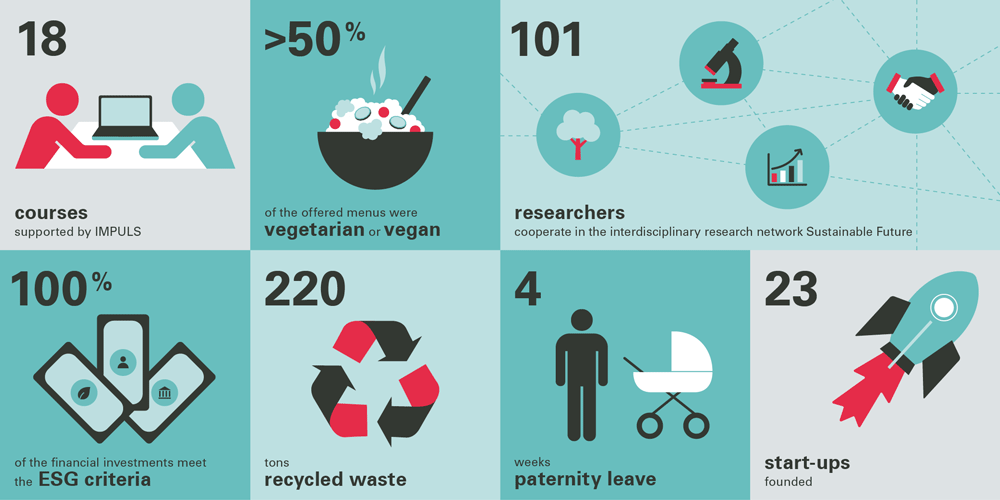Important steps towards a more sustainable university
According to the University of Basel’s Sustainability Report for 2021/2022, flight emissions have increased following the pandemic, but still remain far lower than the 2019 level. Additionally, the university’s financial investments have been aligned to sustainability criteria. A steering committee has defined five action areas to considerably lower emissions again by 2030.
22 June 2023 | Samuel Schlaefli
The University of Basel’s total emissions amounted to 5,561 metric tons CO2-equivalent (tCO2-eq) in 2021 and 6,266 tCO2-eq in 2022. This is one of the indicators in the University of Basel’s latest Sustainability Report, which was just released. The emissions are largely due to heating, air travel, electricity and catering, and their total is still considerably lower than before the pandemic (2019: 8,577 tCO2-eq). This development is largely related to a reduction in flight emissions.
“We have a responsibility to our students and staff, as well as to the city and region,” says Professor Jens Gaab, Delegate for Sustainability at the University of Basel. “That is why we are striving to achieve a substantial, lasting reduction in our greenhouse gas emissions and will be making major contributions to combating climate change in research, teaching, and in dialog with society.”
“Climate Responsibility” report as a basis for the Climate Strategy
In the summer of 2022, the President’s Board tasked a steering group formed from members of the various faculties and university groups with developing recommendations for reducing greenhouse gas emissions and the required steps to achieve them.
These recommendations can be found in the report “Climate Responsibility” which also lays out five high-priority action areas: Campus & Management, Mobility, Research & Dialog, Teaching, Engagement & Culture. There the group laid out concrete, ambitious and realistic goals for the university to achieve in each of these areas by 2030. Based on the report from the steering committee, the “University of Basel Climate Strategy 2024–2030” is currently being developed and will be published by the end of 2023.
The University of Basel’s “less for more” project, which was initiated in 2020, has already led to the implementation of important steps to reduce flight emissions. The goal is to reduce the university’s flight emissions (tCO2-eq) by 30 percent as soon as possible compared to the average for 2017–2019. In 2022, flight emissions rose considerably compared to the prior two years, and they are currently responsible for nearly a third of the university’s total emissions.
Significant leverage from teaching and research
Jens Gaab emphasizes that, besides the operational projects, sustainability is also firmly anchored in the university's teaching and research activities: “The University of Basel takes its responsibility for the climate very seriously. Knowledge is power, and, accordingly, we have a great deal of leverage and thus also responsibility with all our knowledge and skills.”
Since 2005, students in the Master's Degree in the Sustainable Development have been able to prepare themselves for the complex challenges of the climate crisis. Researchers are also examining how to make the transition to a net-zero society possible in several interdisciplinary projects. Since 2022, the University of Basel has been a major partner in the Klimaplattform der Wirtschaft Region Basel, where it is primarily represented by the research network Sustainable Future.
Due to student and societal engagement, awareness of universities’ responsibilities when it comes to their financial investments has also increased in recent years. The University of Basel revised its investment guidelines last year, largely excluding investments in fossil fuels. Companies that have a harmful effect on nature, humans or society will also be excluded. Investments are now only made in companies that meet minimum standards in terms of ecology, social behavior and responsible corporate governance (ESG criteria). Additionally, the university is taking a “best-in-class” approach with the aim of investing only in companies that are among the 30 percent most sustainable in their industry.



